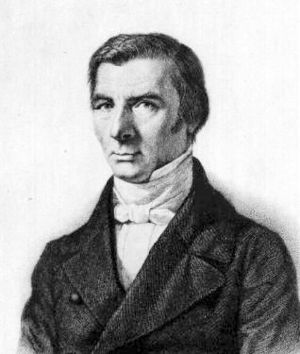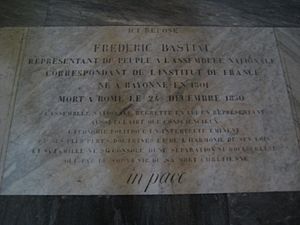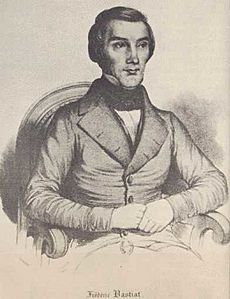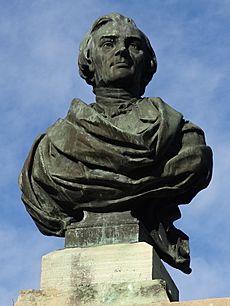Frédéric Bastiat facts for kids
Quick facts for kids
Frédéric Bastiat
|
|
|---|---|
 |
|
| Member of the French National Assembly | |
| In office 1848 – 24 December 1850 |
|
| Personal details | |
| Born |
Claude-Frédéric Bastiat
30 June 1801 Bayonne, France |
| Died | 24 December 1850 (aged 49) Rome, Papal States |
| Academic career | |
| School or tradition |
French Liberal School |
| Influences | Cobden, Dunoyer, Say, Hume, Gibbon, Voltaire, Rousseau, Smith, Turgot |
| Contributions | Legal plunder Parable of the broken window |
Claude-Frédéric Bastiat (born June 30, 1801 – died December 24, 1850) was an important French thinker. He was an economist and writer, known for being a key member of the French Liberal School.
Bastiat was also a member of the French National Assembly, which is like the French parliament. He helped develop the idea of opportunity cost, which is what you give up when you choose one thing over another. He also created the famous story called the parable of the broken window. Another economist, Joseph Schumpeter, called him "the most brilliant economic journalist who ever lived."
He supported classical economics, which are ideas from thinkers like Adam Smith. Bastiat believed strongly in a free market, where people can buy and sell things without much government control. His ideas influenced the Austrian School of economics. He is most famous for his book The Law. In this book, he argued that laws should protect people's rights and property, not take from some to give to others.
Contents
Frédéric Bastiat's Early Life and Career
Frédéric Bastiat was born on June 29, 1801, in Bayonne, a port city in southern France. His father, Pierre Bastiat, was a successful businessman. Frédéric's mother passed away when he was seven years old. His father died two years later, leaving Frédéric an orphan.
He was then raised by his grandfather and his aunt. Bastiat went to school in Bayonne and later at Sorèze. At 17, he left school to work in his uncle's family export business.
Bastiat later wanted to study in Paris, but he couldn't because his grandfather became ill. He stayed to care for him. When his grandfather died, Bastiat inherited the family estate. This allowed him to spend his time studying and thinking about many subjects. These included philosophy, history, politics, and economics.
After a revolution in 1830, Bastiat became involved in politics. He was elected as a local judge in 1831. He also joined a county-level assembly in 1832. In 1848, he was elected to the national assembly after another French revolution.
His public work as an economist began in 1844 when his first article was published. Sadly, his career was cut short by his death in 1850. Bastiat caught tuberculosis, a serious lung illness. This illness made it hard for him to speak. He wrote in his book The Law: "Until the day of my death, I shall proclaim this principle with all the force of my lungs (which alas! is all too inadequate)." This line refers to his illness. He died on December 24, 1850, at the age of 49.
Bastiat's Key Works and Ideas
Bastiat wrote many books and essays about economics and politics. His writings are known for being clear, strong, and often witty. Economist Murray Rothbard said Bastiat was a "superb writer." He added that Bastiat's essays were "brilliant and witty" in showing why government control and protectionism (taxes on imported goods) were bad. Bastiat was a strong supporter of a completely free market.
One of his well-known works is Economic Sophisms. This is a collection of essays that defend free trade. Bastiat wrote it to help leaders of the French Republic avoid economic mistakes.
Economic Sophisms and the Candlemakers' Petition
Economic Sophisms includes a famous satirical story called the "candlemakers' petition." In this story, candlemakers ask the French government to block out the Sun. They argue that the Sun is unfair competition because it provides light for free! This story shows how ridiculous it is to protect certain industries from competition.
Another funny example in the book is a request to ban the use of people's right hands. The idea was that if things were harder to do, people would work more, and that would make society richer. Bastiat used these examples to show how some economic ideas were silly.
The Law (1850)
Bastiat's most famous book is The Law, published in 1850. It explains what a fair system of laws should look like. He argued that laws should help create a free society.
In The Law, Bastiat wrote that everyone has a right to protect their "person, his liberty, and his property." He believed the government's only job is to protect these rights. If the government tries to do more, like giving money to some people by taking it from others, it becomes too powerful. This can lead to what he called "legal plunder."
Bastiat defined "legal plunder" as when the law takes from some people what belongs to them and gives it to others. He said this includes things like "protective tariffs, subsidies, guaranteed profits, guaranteed jobs, relief and welfare schemes, public education, progressive taxation, free credit, and public works." He believed that all these things, when done by law, are a form of socialism. He also joked, "If the natural tendencies of mankind are so bad that it is not safe to permit people to be free, how is it that the tendencies of these organizers are always good?"
"What is Seen and What is Not Seen"
In his 1850 essay "What is Seen and What is Not Seen," Bastiat introduced the idea of opportunity cost. He did this through the parable of the broken window. This story shows that when you look at an economic decision, you should think about both the obvious effects and the hidden ones. For example, if a window breaks, a glazier gets work, which seems good. But the money spent on the window can't be spent on something else, like new shoes. That "something else" is the unseen cost.
Bastiat's Core Beliefs
Bastiat believed that the government's main job is to protect people's rights to life, freedom, and property. He thought it was wrong for the government to get involved in other personal matters. He argued that if the government uses laws to take from some people and give to others, it is doing "legalized plunder." This is different from people agreeing to trade things fairly.
He explained that if some groups use the government for "legalized plunder," other groups will try to do the same. Bastiat believed the solution was to stop all forms of legal plunder. He thought that if the law promotes socialist policies, it cannot truly protect life, freedom, and property. Instead, it goes against the very things it should defend.
Bastiat was a strong supporter of free trade. He was inspired by and worked with Richard Cobden and the English Anti-Corn Law League, who fought against taxes on imported grain.
Some economists see Bastiat as an early thinker of the Austrian School of economics. This is because he focused on how what consumers want drives economic progress.
One of Bastiat's most important ideas was that good economic decisions require looking at the "full picture." This means considering not just the immediate results of a decision, but also the long-term effects. You also need to think about how a decision affects everyone, not just one group. As Bastiat famously said, an economist must consider both "What is Seen and What is Not Seen." This idea was later expanded by Henry Hazlitt in his book Economics in One Lesson.
The "Negative Railroad" Idea
In Economic Sophisms, Bastiat also talked about how tariffs (taxes on imported goods) can be harmful. He imagined a railroad between Spain and France that makes trade cheaper. This helps people in both countries because goods become less expensive.
However, producers in each country might complain. They might say that foreign goods are now too cheap and they can't compete. So, they ask their governments to add tariffs. These tariffs would make foreign goods expensive again, as if the railroad didn't exist.
Bastiat pointed out two things:
- Even if tariffs help some producers, they hurt consumers. Consumers have to pay higher prices for goods they could get cheaply.
- Tariffs cancel out all the benefits of the railroad. They make the railroad pointless.
To show how silly this is, Bastiat suggested that instead of tariffs, the government should just destroy the railroad wherever foreign goods compete with local ones. Since this would be almost everywhere, he joked that the government should just build a broken or "negative" railroad from the start. This shows how tariffs can undo progress and harm everyone.
Bastiat's Resting Place

Frédéric Bastiat died in Rome, Italy. He is buried at San Luigi dei Francesi, a Catholic church in the center of the city. On his deathbed, he said that his friend Gustave de Molinari was his "spiritual heir." Molinari had published Bastiat's book The Law.
See also
 In Spanish: Frédéric Bastiat para niños
In Spanish: Frédéric Bastiat para niños
- Age of Enlightenment
- Bastiat Prize
- List of liberal theorists
 | Georgia Louise Harris Brown |
 | Julian Abele |
 | Norma Merrick Sklarek |
 | William Sidney Pittman |



